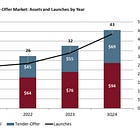Forced Liquidity: Bluerock's Solution to Redemption Queue
When an interval fund goes public
I like liquidity. A lot.
So much so, the Wall Street Journal recently quoted me in a piece exploring why even Vanguard is wading into private markets.
So, naturally, when Bluerock announced plans to take their Total Income+ Real Estate Fund public, I had to take a closer look. After all, it’s not every day an interval fund makes the leap to the NYSE, promising more liquidity.
An interval fund is a type of closed-end fund that offers to repurchase shares from investors at set intervals (often quarterly), rather than allowing daily liquidity. These structures are typically used to house less liquid assets, such as private real estate or credit.
But is this about investor liquidity, or GP survival?
Today, we’ll discuss:
What you’re really buying in this “fund of funds” structure
Why the fee stack might make your favorite CFA break into a sweat
Whether the income supports the distributions (spoiler: it doesn’t)
And if a public listing actually solves the core problems or simply papers over them.
📚 Need a refresher on interval funds?
Quick reminder: this is not financial advice, nor a solicitation to sell securities. All information is shared strictly for educational purposes. Do your own due diligence.
1. The Background
TI+ launched in 2012 as a way for individual investors to “co-invest” with global endowments and pensions.
Fast forward to mid-2025: the fund manages about $4.1 billion in assets, giving exposure to roughly $343 billion of underlying real estate via 6,575 properties held in institutional funds.
Keep in mind: this fund offers periodic liquidity through scheduled redemption windows. Since inception, it has paid out over $4.7 billion to redeeming investors, including $423.6 million so far in 2025.
However, in recent quarters, a huge redemption backlog has emerged. More than 25% of TI+’s AUM is now stuck in the redemption queue. Shareholders see just 20–30% of requested liquidity fulfilled each quarter.
2. It’s a Fund-of-Funds With a Top-Heavy Portfolio
TI+ is not a direct owner of underlying properties: it allocates 100% through third-party private institutional real estate vehicles (private equity real estate, private credit, logistics, data centers, life science, etc.)
On the surface, you’re diversified across thousands of properties. In reality, over 58% of assets are clumped in the top 10 holdings, so your fate is closely tied to a handful of outside managers:




